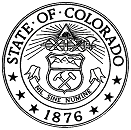![]() The information on this page is archived and provided for reference purposes only. It may be outdated or no longer maintained.
The information on this page is archived and provided for reference purposes only. It may be outdated or no longer maintained.
Address Confidentiality Program enrolls 200 households
Buescher credits work of victim advocates
Denver, October 21, 2009 – The Colorado Address Confidentiality Program (ACP), operated by the Secretary of State’s office, surpassed 200 households this past week. The ACP provides a substitute address and mail forwarding service for survivors of domestic violence, sexual assault, stalking and harassment. The program began enrolling participants on July 1, 2008. Currently, 26 other states have similar type programs.
“The early success of this program shows that the need is out there and this effort provides an additional layer of protection for these individuals,” Secretary of State Bernie Buescher said. “Without a doubt, the people on the ground helping these survivors are the true heroes and I’m happy to join them and be a part of that protection.”
Over the past year, the Secretary of State’s office has trained nearly 400 victim advocates, legal advocates and mental health professionals, called “application assistants,” about the program and how to enroll eligible individuals. Typically, these application assistants already provide counseling, referral or other support service for victims of domestic violence and other crimes. The ACP can increase a victim’s safety by enhancing an existing safety plan.
“The ACP is another step in the process toward becoming a survivor,” said Gina Gardner-Wood, a legal advocacy supervisor at Family Tree Domestic Violence Services and applicant assistant with the program. “This is a really great tool in the safety planning area and makes it more difficult to locate survivors.”
The program is comprised of two components that work in tandem to help protect participants. New enrollees are provided a substitute address that becomes their new legal address. Because it is their legal address, all state and local governmental agencies (with limited exceptions) are required to accept the address as an official work, home and school address. When participants use this address, their mail is routed to the ACP mailbox, and then forwarded to participants at their actual address.




 Menu
Menu  Search
Search 
